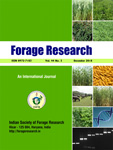SEVA NAYAK DHEERAVATHU*, THULASI BAI VADITHE, NILAMANI DIKSHIT, USHA T. N, SAIDA NAIK VADITHE, VENKATESWARLU RONDA, MANASA VAKADA AND BANDEPPA SONTH
ICAR-Indian Institute of millets Research, Rajendra Nagar (Hyderabad), India
Department of Microbiology, Acharya Nagarjuna University, Guntur (Andhra Pradesh), India
ICAR- Indian Grassland and Fodder Research Institute, Jhansi (Uttar Pradesh), India
Zonal Agricultural and Horticultural Research Station, Keladi Shivappa Nayaka University of Agricultural and
Horticultural Sciences, Shivamogga (Karnataka), India
ANGRAU-Agricultural Research Station, Jangameswarapuram, Guntur (Andhra Pradesh), India
Indian Institute of Rice Research, Rajendra Nagar (Hyderabad), India
*(e-mail : sevanayak2005@gmail.com)
(Received : 2 June 2022; Accepted : 24 June 2022)
SUMMARY
As global population continues to increase, crop yields and forage crop yield must increase proportionally to meet the future demand for food and fodder. Forage and livestock sector has increased at a very rapid rate throughout the country and worldwide in recent years due to their important roles in sustainable forage yield and crop productivity. Atmospheric carbon dioxide concentration [CO2] is increasing rapidly and is expected to surpass 550 ppm within this century. Mean annual temperature significantly increased 0.4ºC over the last 100 years. Atmospheric CO2 and temperature may significantly modify plant, production and productivity. Changes in leaf anatomy and ultra-structure are associated with physiological performance in the context of plant adaptations
to climate change. Elevated CO2 enhance root exudation, root growth and increased plant biomass. Grasslands occupy in excess of 25% of the Earth’s land area, but forage crops and grassland species have received limited attention from re- searchers studying climate change. In this review we discussed about the effect of elevated CO2 and temperature on physiological and biochemical changes of forage crops and development of future climate-resilient varieties for sustainable crop production and livestock production.
Key words: Elevated CO2
, temperature, climate change and forage crops

